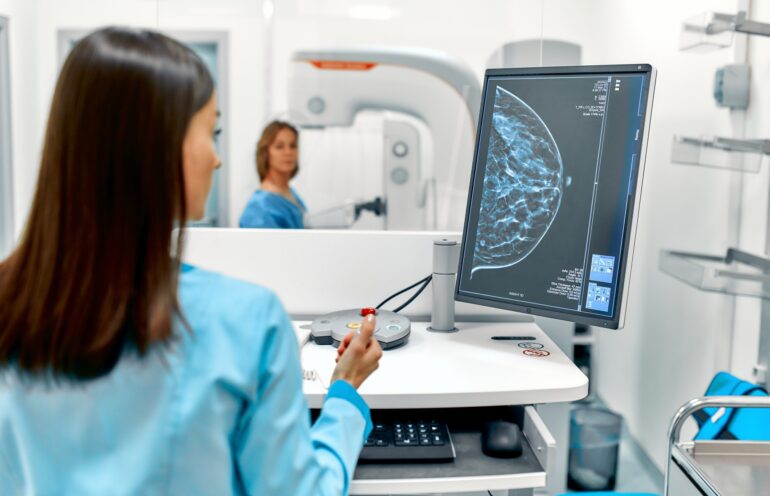TL;DR:
- Riverside Health System collaborates with Transpara® Breast Care, an AI system for mammogram cancer detection.
- Transpara AI serves as a second opinion for radiologists, spotting cancerous breast tissue patterns.
- AI-driven early detection enhances treatment opportunities.
- Transpara, trained on one million mammograms, gains FDA approval and CE marking.
- The AI system improves patient care without additional costs.
- It speeds up mammogram result analysis and reduces wait times and recalls.
- Riverside Health System believes this technology will ease patient stress and expedite early cancer diagnosis.
Main AI News:
In a pioneering move to revolutionize breast cancer detection, Riverside Health System has joined forces with Transpara® Breast Care, a prominent artificial intelligence (AI) system tailored to empower radiologists in identifying cancers in mammograms. This cutting-edge software acts as a trusted second opinion for medical practitioners, enabling them to spot patterns of cancerous breast tissue and, crucially, to detect cancer in its nascent stages when treatment options are more favorable.
Artificial Intelligence (AI) represents the culmination of technology’s evolution, as machines, through relentless repetition and learning, acquire specific skills without human intervention. The applications of AI are myriad, encompassing areas like autonomous vehicles, voice-activated assistants, personalized learning platforms, and fraud prevention. Yet, the most recent frontier in AI deployment has emerged within the healthcare sector.
Transpara, established in 2014, harnesses the formidable capabilities of machine learning to identify and pinpoint patterns indicative of cancerous tissue. It lends invaluable support to radiologists in the arduous task of scrutinizing mammogram results. This AI system underwent rigorous training by analyzing a staggering one million mammograms, sourced from research institutions across the globe. With each mammogram that passes through the Transpara system, the software grows more adept at identifying breast cancer and quickly recognizing suspicious tissue characteristics. Notably, Transpara stands as a trailblazing achievement—the first computer software ever designed, rigorously tested, and endorsed by both the Federal Drug Administration and CE marked for use throughout Europe.
Dr. Benjamin Pettus, M.D., PH.D., a distinguished radiologist at Riverside Regional Medical Center, effuses enthusiasm for the transformative potential of this AI-powered marvel. “We are thrilled to introduce this cutting-edge technology to our patients and the communities we serve,” he exclaims. “This AI-powered algorithm serves as an additional layer of protection for our patients, and it comes at no extra cost. While reporting, management, and subsequent care remain unaltered and under the expert guidance of radiologists, we anticipate that the integration of this software will not only alleviate patient stress but also expedite early cancer detection, reduce wait times, diagnostic recalls, and unnecessary biopsies.“
Patients will continue to undergo their annual 2-D or 3-D mammograms as usual. Following the screening, the scans are seamlessly transmitted through a secure, HIPAA-compliant AI portal, expediting the radiologist’s analysis and enhancing the precision of mammogram reports.
Annie Smith, Director of Imaging Services at Riverside Regional Medical Center, underscores the life-saving potential of this AI integration. “In tandem with regular mammogram screening, Transpara AI has the power to save lives,” she asserts. “The software equips radiologists with an invaluable second perspective on results, enhancing the chances of detecting cancer at an earlier, more treatable stage. We are thrilled to offer this additional layer of defense to our patients.“
Conclusion:
Riverside’s partnership with Transpara signifies a significant advancement in breast cancer detection. The integration of AI technology promises to improve patient outcomes, reduce healthcare costs, and enhance the efficiency of mammogram screenings. This innovation reflects the growing role of AI in healthcare and underscores its potential to reshape the market by delivering more accurate and timely diagnoses.

